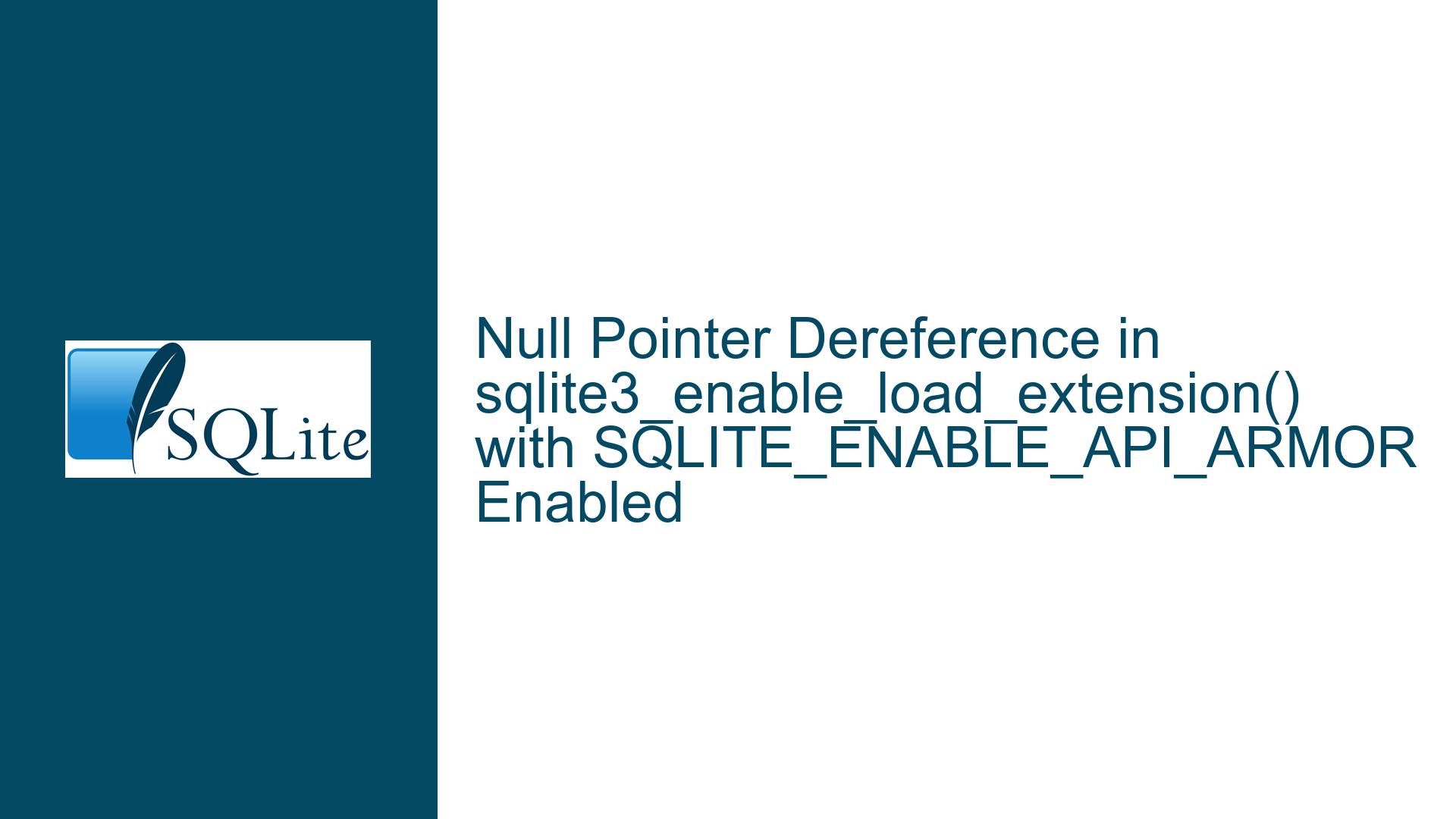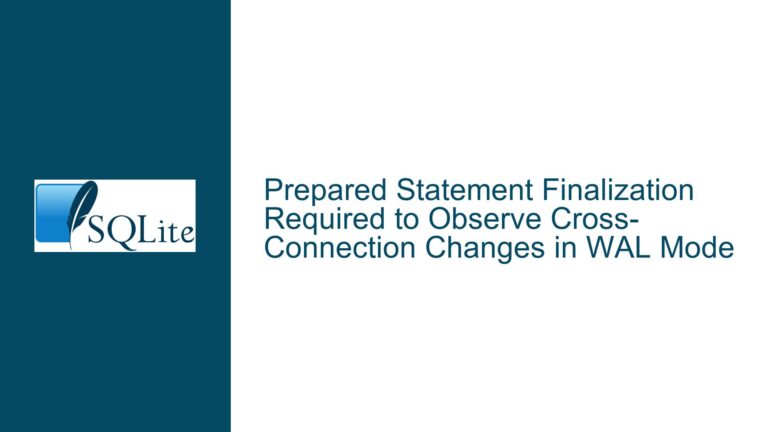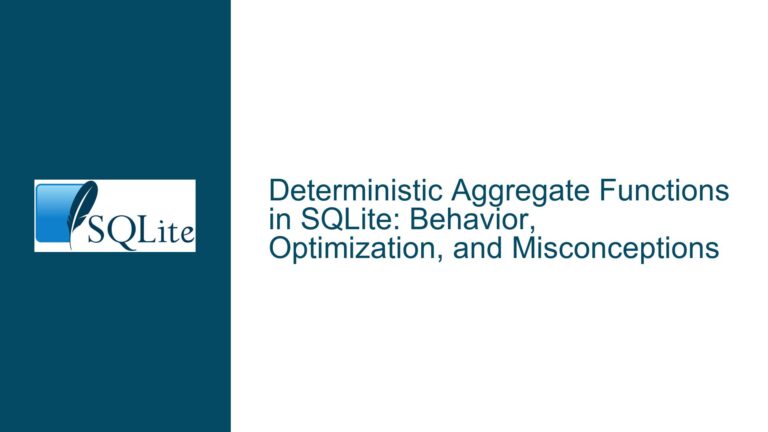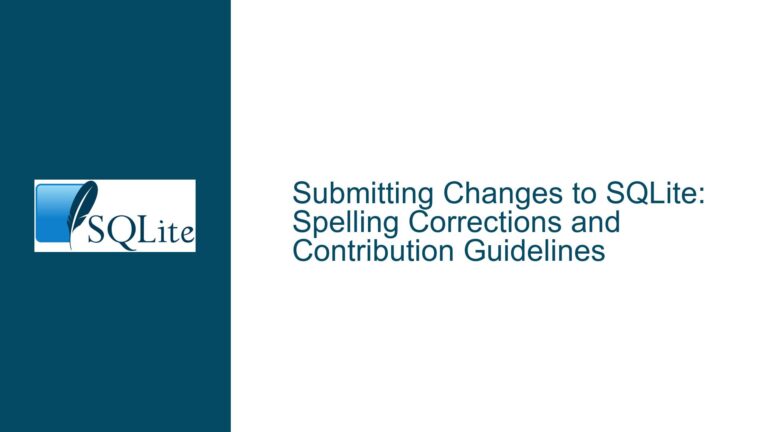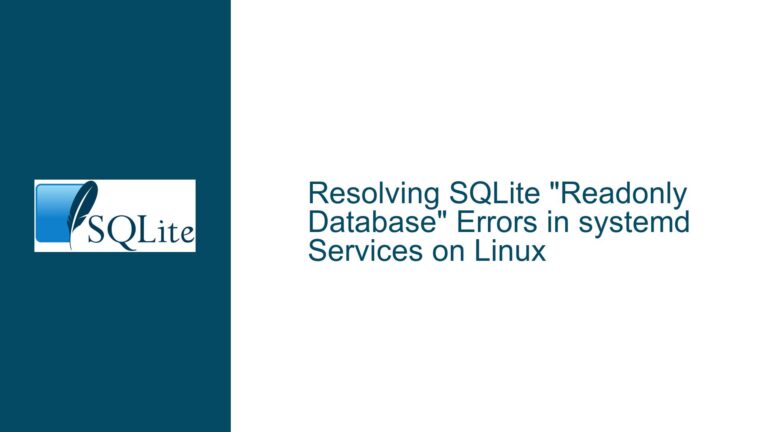Null Pointer Dereference in sqlite3_enable_load_extension() with SQLITE_ENABLE_API_ARMOR Enabled
Issue Overview: Null Pointer Dereference in SQLite Extension Loading API Under Armor Mode
The core problem revolves around a segmentation fault or null pointer dereference crash occurring when calling the sqlite3_enable_load_extension() function with a NULL database handle (sqlite3* db) while SQLite is compiled with the -DSQLITE_ENABLE_API_ARMOR flag. This flag is designed to harden SQLite’s public APIs against misuse by adding parameter validation checks, such as ensuring pointers are non-NULL before dereferencing them. However, in this specific scenario, the armor mechanism fails to intercept the NULL database handle passed to sqlite3_enable_load_extension(), resulting in a crash.
This issue is critical because it violates the expected behavior of the SQLITE_ENABLE_API_ARMOR configuration option, which should prevent such undefined behavior by design. The function sqlite3_enable_load_extension() is intended to enable or disable extension loading for a specific database connection. When invoked with a NULL database handle, the function attempts to access members of the sqlite3 structure (e.g., db->flags), leading to a dereference of address 0x0. The absence of a NULL check in this function—despite the armor flag being active—exposes a gap in SQLite’s API hardening strategy.
The crash manifests as a direct result of the following sequence:
- A developer initializes a
sqlite3*pointer to NULL (due to an unopened database, allocation failure, or logical error). - The developer calls
sqlite3_enable_load_extension(db, 1)to enable extensions for this invalid handle. - The SQLite implementation proceeds to dereference
dbwithout validating its non-NULL status underSQLITE_ENABLE_API_ARMOR.
This behavior contradicts the purpose of SQLITE_ENABLE_API_ARMOR, which is explicitly documented to add safety checks to "application-facing" APIs. The inconsistency suggests either an oversight in the implementation of armor checks for this specific function or a broader misunderstanding of how the armor flag interacts with certain API endpoints.
Possible Causes: Architectural Gaps in API Armor Validation and Function-Specific Oversights
1. Incomplete Implementation of SQLITE_ENABLE_API_ARMOR Across All APIs
The SQLITE_ENABLE_API_ARMOR flag is a compile-time option that modifies SQLite’s public API functions to include preliminary sanity checks. These checks are typically implemented via macros or inline functions that validate parameters (e.g., sqlite3_mutex_enter(db->mutex) only if db != NULL). However, not all API functions may be wrapped with these checks. The sqlite3_enable_load_extension() function might have been excluded from the armor validation logic due to:
- Omission in Code Generation: If the armor checks are applied using a code generator or script,
sqlite3_enable_load_extension()might have been accidentally excluded from the list of functions to harden. - Historical Code Inertia: If the function was added after the initial implementation of
SQLITE_ENABLE_API_ARMOR, its developers might have neglected to integrate it into the armor framework.
2. Misaligned Expectations of API Armor Scope
The SQLite documentation states that SQLITE_ENABLE_API_ARMOR causes SQLite to "perform additional sanity checks on its API parameters." However, it does not explicitly guarantee that all API functions will include NULL checks. Developers might assume comprehensive coverage, while the implementation only applies armor checks to a subset of high-risk functions. This discrepancy between expectation and reality could lead to unexpected crashes in functions like sqlite3_enable_load_extension(), which are not armored despite the flag being set.
3. Ambiguity in API Contract for sqlite3_enable_load_extension()
The SQLite API documentation for sqlite3_enable_load_extension() does not explicitly state that passing a NULL database handle is undefined behavior. While seasoned developers might recognize that a NULL sqlite3* is invalid in most contexts, the absence of armor checks creates a trap for those relying on SQLITE_ENABLE_API_ARMOR to validate parameters. This ambiguity could stem from:
- Implicit Assumptions: The SQLite codebase might assume that
sqlite3_enable_load_extension()is only called with a valid database handle, as extensions cannot be loaded without an open database. However, this assumption is not enforced at the API level when armor is enabled. - Inconsistent Application of Defensive Coding Practices: Functions like
sqlite3_exec()orsqlite3_prepare_v2()include explicit NULL checks (under certain configurations), butsqlite3_enable_load_extension()does not, creating an inconsistency in the API’s safety posture.
4. Compiler or Platform-Specific Optimization Side Effects
In rare cases, compiler optimizations might interfere with the expected behavior of the armor checks. For example, if the armor logic relies on conditional macros that are optimized away when SQLITE_ENABLE_API_ARMOR is defined, the NULL check might be omitted from the compiled binary. However, this is less likely given SQLite’s rigorous testing across platforms.
Troubleshooting Steps, Solutions & Fixes: Mitigating and Resolving the Null Handle Crash
Step 1: Validate the Presence of SQLITE_ENABLE_API_ARMOR in the Build
Confirm that the SQLite library being used was definitively compiled with -DSQLITE_ENABLE_API_ARMOR. This can be done by:
- Inspecting the build logs for the presence of the flag.
- Querying the
sqlite3_compileoption_used("SQLITE_ENABLE_API_ARMOR")function at runtime. If this returns 0, the flag was not enabled during compilation. - Checking the
sqlite3_config(SQLITE_CONFIG_LOG, ...)output for armor-related diagnostics.
If the flag is absent, recompile SQLite with -DSQLITE_ENABLE_API_ARMOR and retest the crash scenario.
Step 2: Analyze the sqlite3_enable_load_extension() Source Code
Examine the SQLite source code (version 3.43.0 or newer) to determine whether sqlite3_enable_load_extension() includes a NULL check under the SQLITE_ENABLE_API_ARMOR guard. The relevant code is in main.c:
SQLITE_API int sqlite3_enable_load_extension(sqlite3 *db, int onoff){
#ifdef SQLITE_ENABLE_API_ARMOR
if( !sqlite3SafetyCheckOk(db) ) return SQLITE_MISUSE_BKPT;
#endif
sqlite3_mutex_enter(db->mutex);
db->flags = (onoff) ? (db->flags | SQLITE_LoadExtension)
: (db->flags & ~SQLITE_LoadExtension);
sqlite3_mutex_leave(db->mutex);
return SQLITE_OK;
}
If the sqlite3SafetyCheckOk(db) check is missing, this is the root cause. The sqlite3SafetyCheckOk() function validates that db is non-NULL and initialized. If this check is absent, the function proceeds to sqlite3_mutex_enter(db->mutex), which dereferences db, causing a crash when db is NULL.
Step 3: Patch the SQLite Source Code to Include Armor Checks
If the NULL check is missing, modify sqlite3_enable_load_extension() to include the armor guard:
SQLITE_API int sqlite3_enable_load_extension(sqlite3 *db, int onoff){
#ifdef SQLITE_ENABLE_API_ARMOR
if( !sqlite3SafetyCheckOk(db) ) return SQLITE_MISUSE_BKPT;
#endif
/* ... existing code ... */
}
Recompile SQLite and verify that passing a NULL db now returns SQLITE_MISUSE_BKPT instead of crashing.
Step 4: Implement Defensive Programming in Application Code
Regardless of SQLITE_ENABLE_API_ARMOR, enforce NULL checks in application code before invoking sqlite3_enable_load_extension():
sqlite3 *db = NULL;
// ...
if(db != NULL){
sqlite3_enable_load_extension(db, 1);
} else {
// Handle error: database not opened
}
This practice eliminates reliance on SQLite’s internal safeguards and ensures robustness across different build configurations.
Step 5: Advocate for Upstream Fixes in SQLite
File a bug report or submit a patch to the SQLite team (contact via mailing list or GitHub) to request that the sqlite3_enable_load_extension() function be updated to include armor checks. Reference the inconsistency with other armored APIs like sqlite3_exec(), which includes a sqlite3SafetyCheckOk() guard.
Step 6: Utilize Static and Dynamic Analysis Tools
Employ tools such as:
- Clang Static Analyzer: Detects potential NULL pointer dereferences at compile time.
- Valgrind: Identifies invalid memory accesses during runtime testing.
- AddressSanitizer (ASan): Flags immediate crashes caused by dereferencing NULL pointers.
These tools can catch the misuse of sqlite3_enable_load_extension() even when SQLITE_ENABLE_API_ARMOR is not fully effective.
Step 7: Review Cross-Platform Compatibility
Test the patched SQLite build across target platforms (Windows, Linux, macOS, embedded systems) to ensure the NULL check behaves consistently. Some platforms may treat NULL dereferences differently (e.g., generating signals versus silent corruption), and the SQLITE_MISUSE_BKPT return value must be uniform.
Step 8: Document the Behavior in Application Guidelines
Update internal developer guidelines to explicitly warn against passing NULL handles to sqlite3_enable_load_extension(), even when using SQLITE_ENABLE_API_ARMOR. Highlight this function as a known exception to the armor checks until upstream fixes are adopted.
Final Resolution
The null pointer dereference in sqlite3_enable_load_extension() under SQLITE_ENABLE_API_ARMOR is resolved by ensuring the function includes a sqlite3SafetyCheckOk() guard. Developers must either patch their SQLite builds or adopt defensive checks in their code until the fix is mainstream. This incident underscores the importance of rigorous API hardening audits and the value of combining compile-time safeguards with runtime validation in critical systems.
